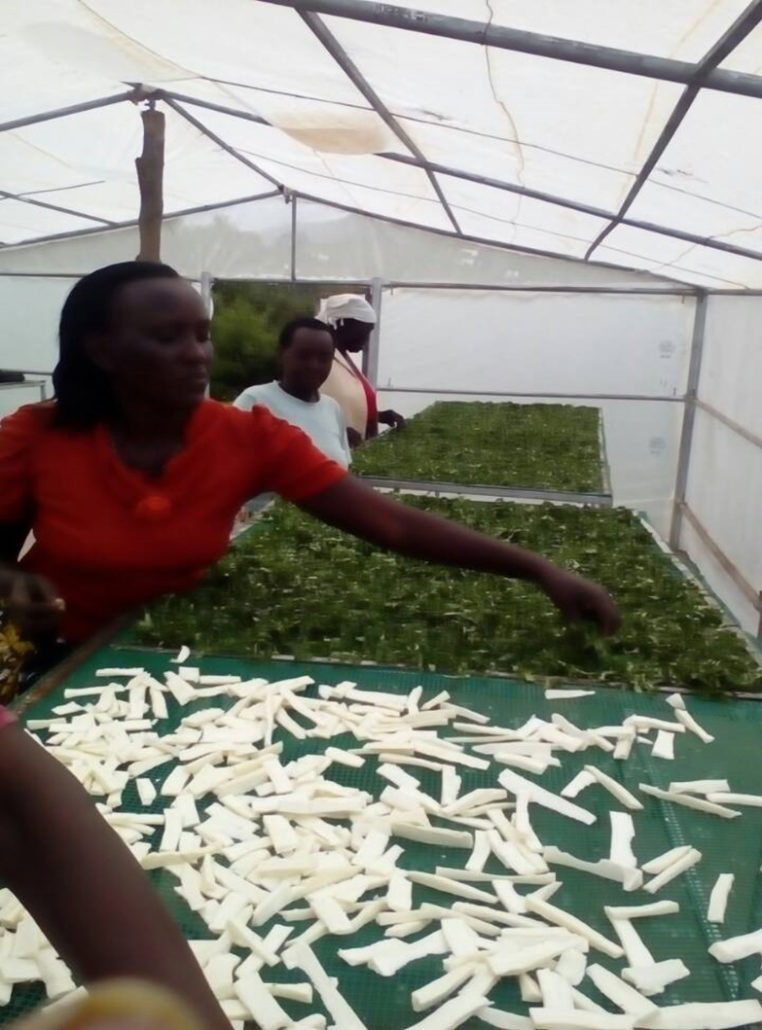Travelling 70 kilometers from Machakos town, you will meet the Nthuva self-help group in Kathama location that has 23 members. The group members make a living from production of drought tolerant crops(DTC) and vegetables. The DTC are adapted to the climate of the area and farmers have a guaranteed harvest even at the seasons of low rainfall. Consumption of DTC has reduced over years with current generation preferring fast foods to indigenous crops. However, Nthuva self-help group have crafted a way on promoting and increasing the consumption of the less preferred crops by baking cakes and chapatti from cassava flour, millet and sorghum. Products made from these DTC are known to be more nutritious and the Nthuva self-help group is often requested to prepare such foods during community events such as weddings. Due to the increased demand of the products beyond Kathama location, the Nthuva self-help group trains other self-help groups on value addition of DTC in order to promote consumption.
A solar drier to facilitate the drying of cowpea leaves
Kathama location being a semi-arid region and heavily relying on rain fed agriculture. Most households lack green vegetables as part of their diet. The Nthuva self-help group manage to bridge this gap by drying cowpea leaves. Previously, drying of cowpeas leaves was done under the shade and took 5days, but with the support of a solar drier, farmers dry their products in a maximum of two days. With the objective to improve agricultural production through better farming methods, value addition and marketing, Inades Formation through the support of bread for the world procured a solar drier that has reduced the post-harvest wastage thus increasing volumes and this also translates to higher profits. During the previous season, farmers from Nthuva self-help group dried over 2,000 bags of cowpea leaves which were packaged in 1 kg paper bags. These leaves are stored for consumption during the dry season. They also dried 5 buckets of cassava. Once the cassava is dried, it is grinded into flour which is mixed with sorghum, millet & maize flour to prepare porridge and ugali. The blended product is highly nutritious and recommended for all household members consumption.

All the members of the group grow the cowpeas for both household consumption and commercial use. Two days in a week, the group members are given an opportunity to individually dry their vegetables for household use while on the other week days, the group dries the vegetables for sale at the nearby retail shops. Apart from improving nutrition, increasing consumption of DTC the group has managed to devise better strategies for marketing their produce to realize their returns. Part of their income is saved in the rural microfinance SOFDEV, a model designed to respond to the financial need in rural settings.
Group plans
The group plans to pilot the drying of mangoes this season to ensure the product will be available even after the mango season is over. Nthuya self-help group plans to hire land that will facilitate large scale production of vegetables and expand their market base of the products beyond Kathama location. The group members have plans to secure a plot of land which is near a constant source of water so as to plant the DTC products they require throughout the year without having to wait for the rains. Nthuva self-group benefited with partnership of Karlo and Inades Formation which facilitated the group with a money maker pump that will be used for large scale production of the DTC. They also intent to secure good packaging materials for their products including branding.









